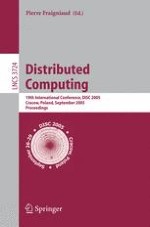2005 | OriginalPaper | Buchkapitel
Musical Benches
verfasst von : Eli Gafni, Sergio Rajsbaum
Erschienen in: Distributed Computing
Verlag: Springer Berlin Heidelberg
Aktivieren Sie unsere intelligente Suche, um passende Fachinhalte oder Patente zu finden.
Wählen Sie Textabschnitte aus um mit Künstlicher Intelligenz passenden Patente zu finden. powered by
Markieren Sie Textabschnitte, um KI-gestützt weitere passende Inhalte zu finden. powered by
We propose the
musical benches problem
to model a wait-free coordination difficulty that is orthogonal to previously studied ones such as agreement or symmetry breaking (leader election or renaming). A
bench
is the usual binary consensus problem for 2 processes. Assume
n
+1 processes want to sit in
n
benches as follows. Each one starts with a preference, consisting of a bench and one place (left or right) in the bench where it wants to sit. Each process should produce as output the place of the bench where it decides to sit. It is required that no two processes sit in different places of the same bench. Upon the observance of a conflict in one of the benches an undecided process can “abandon” its initial bench and place and try to sit in another bench at another place.
The musical benches problem is so called because processes jump from bench to bench trying to find one in which they may be alone or not in conflict with one another. If at most one process starts in each bench, the problem is trivially solvable– each process stays in its place. We show that if there is just one bench where two processes rather than one, start, the problem is wait-free unsolvable in read/write shared memory. This impossibility establishes a new connection between distributed computing and topology, via the Borsuk-Ulam theorem.
The musical benches problem seems like just a collection of consensus problems, where by the pigeon hole principle at least one of them will have to be solved by two processes. Consequently, one is tempted to try to find a bivalency impossibility proof of the FLP style. Our second result shows that there is no such proof: We present an algorithm to solve the musical benches problem using set agreement, a primitive stronger than read/write registers, but weaker than consensus. Thus, an FLP-style impossibility for musical benches will imply an FLP-style impossibility of set-consensus.
The musical benches problem can be generalized by considering benches other than consensus, such as set agreement or renaming, leading to a very interesting class of new problems.
